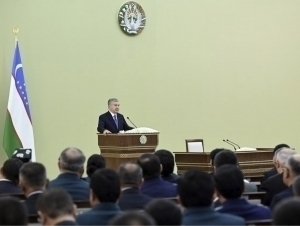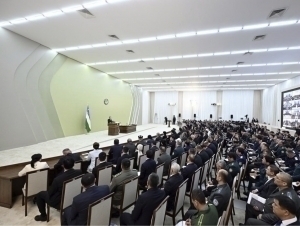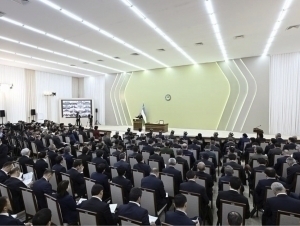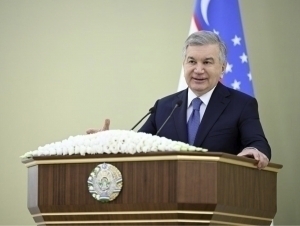Weekly digest: Unfulfilled promises, the return of Nizomiddinov, US support
Review
−
13 April 2025 7326 13 minutes
The world is in turmoil. Wars are reigniting. The massacre in Gaza has intensified, and people—especially children—are suffering from hunger. Uzbekistan, too, is not staying silent. The distant winds of conflict are being felt here as well. Isn’t it the economic crises we’re talking about?
This week, the song “Siqilma” became a trend in Uzbekistan. Perhaps its sudden popularity reflects how well it resonates with the everyday struggles and worries of ordinary Uzbeks—their unrelenting battles with livelihood. Who knows.
Now the price of electricity and gas increases every year
One of my teachers used to say, “Promises are usually made about things that won't be fulfilled.” That sentiment appears especially true in light of the Cabinet of Ministers’ Resolution No. 337, adopted on June 15, 2024. This document—“On additional measures to further improve the tariff policy in the fuel and energy sector”—stipulated that electricity and natural gas tariffs in Uzbekistan would remain in effect without change for no less than three years, starting from 2026. However...
Just one day before this resolution was to take effect—on March 31—the Cabinet adopted a new resolution. According to this new decree, prices for electricity and gas will now increase annually.
Under the new resolution, different tariff tiers will apply to electricity usage between 201 kWh and 500 kWh. The Cabinet’s April 16, 2024, resolution originally proposed raising electricity and gas prices beginning on April 1, 2025. However, a presidential order postponed this increase by one month, setting the new date as May 1.
Based on the initial proposal, electricity consumed by households between 201 and 1,000 kWh per month would cost 1,000 soums per kWh. The most recent government decision on March 31 adjusted this rate down to 800 soums.
In summary:
Currently, households pay 450 soums per kWh for the first 200 kWh of electricity and 900 soums for consumption between 201 kWh and 500 kWh.
Starting May 1, the first 200 kWh will cost 600 soums, and the 201–500 kWh range will cost 800 soums instead of the initially proposed 1,000 soums.
This means that in both cases, consumers will pay a total of around 360,000 soums.
Let’s take a closer look at this recurring issue of promises that are made but not kept. A previous resolution adopted by the Cabinet of Ministers on April 13, 2019—“On Additional Measures to Improve Tariff Policy in the Electricity Sector”—guaranteed that electricity tariffs would remain unchanged for at least three years starting from 2023. That resolution is no longer in force.
According to the newly adopted rules, starting from January 1, 2026, prices for electricity and natural gas will be indexed annually on May 1, by an amount not exceeding 10 percent, based on the country’s annual inflation rate. In other words, the prices will rise each year in line with inflation.
For context: Uzbekistan’s inflation rate in 2024 was 9.8 percent. If inflation in 2025 hits 10 percent, then electricity and gas prices are also set to rise by 10 percent in 2026.
According to economist Otabek Bakirov, “The fact that tariffs will continue to increase in the coming years means that the processes referred to as energy reform have completely lost their meaning. The Uzbek economy will continue to lose what little competitiveness it has left. Tariffs have become a way to extract money from the pockets of citizens and businesses—not a bridge to a free market, but a tool to cover inefficient and overpriced projects and service ever-growing debts.”
The Uzbek delegation holds a series of meetings in the US
A delegation from Uzbekistan, headed by Abdulaziz Kamilov, the Special Representative of the President for Foreign Policy, visited the United States and held several meetings with officials from the Trump administration.
On April 7, Kamilov met with US Deputy Secretary of State Christopher Landau in Washington. The Uzbek side has not released any official statements about the meeting. Interestingly, the bulletin published by the US State Department referred to Kamilov not as the President’s Special Representative for Foreign Policy, but as the Deputy Chairman of Uzbekistan’s Security Council—a position that has not yet been confirmed by Uzbek media.
During the meeting, the US reiterated its support for Uzbekistan’s independence, sovereignty, and territorial integrity, as well as for the continued strengthening of the US-Uzbek strategic partnership.
Deputy Secretary Landau expressed high regard for Uzbekistan’s efforts to deepen bilateral cooperation in civil nuclear energy, critical minerals investment, and other sectors of the economy. He also thanked Uzbekistan for its continued collaboration in combating illegal immigration and terrorism.
On April 9, Uzbekistan’s Foreign Minister Bakhtiyor Saidov met with US Secretary of State Marco Rubio and National Security Advisor Michael Waltz in Washington.
Saidov shared that he and Rubio held a comprehensive exchange of views on the current state and future directions of Uzbek-American relations. Key topics included enhancing political dialogue, expanding economic and investment ties, developing regional cooperation, and strengthening shared commitments to security and stability in Central Asia.
“We value the United States’ steadfast support for our reform agenda in Uzbekistan. We agreed to maintain the positive momentum of bilateral relations by continuing high-level dialogue and practical cooperation within the framework of our strategic partnership,” Saidov wrote.
According to US State Department spokeswoman Tammy Bruce, Uzbekistan has decided to become a full member of the Global Coalition to Counter ISIS. Secretary Rubio welcomed this development during his meeting with Saidov. He also expressed gratitude to Uzbekistan for its assistance in the repatriation of individuals deported from the United States. However, there has been no official statement from Tashkent on joining the Global Coalition to Counter ISIS.
“The United States aims to work with Uzbekistan to modernize safe nuclear technologies, increase bilateral investment, and enhance cooperation in the area of key minerals and other industries to further develop our strategic partnership,” Bruce added.
As part of the delegation, Minister of Investment, Industry, and Trade Laziz Kudratov met with executives from major companies, corporations, and industrial associations in the US. During these meetings, several agreements were signed to enhance cooperation in the mineral resources sector. The deals included plans for investing in the exploration and extraction of mineral deposits, constructing high-performance grinding complexes (HPGR), introducing innovative technologies, adding value to key raw materials, and improving the skills of Uzbek professionals.
Will US tariffs also affect Uzbekistan?
US President Donald Trump’s “reciprocal” tariffs on foreign trade partners have caused significant disruption to the global economy—and these ripple effects are also reaching Uzbekistan. The base tariff rate was set at 10 percent, but in practice, the rates vary depending on the size of the US trade deficit with individual countries. For example, Uzbekistan faces a 10% tariff, while China’s rate is 145%, and the European Union’s is 20%.
In response, China raised its tariffs on American goods to 125 percent.
No official in Uzbekistan has yet commented on the tariffs imposed by the US. However, President Shavkat Mirziyoyev indirectly addressed global economic instability during a recent videoconference focused on boosting tourism and speeding up investment projects in the regions.
Without naming the US directly, he spoke about the impact of global market events. “Right now, we are witnessing an emergency in the global economy. Over just three or four days, $10 trillion vanished from international financial markets,” Mirziyoyev said.
“Anyone who thinks these shocks won’t affect us is mistaken. Some of that money could have reached us through investments, loans, or Eurobonds. In such circumstances, every governor and regional economic team must analyze the situation daily and systematically address the tasks of preserving production levels, jobs, and exports,” he stressed.
Notably, President Trump later announced a temporary suspension of broad tariffs on trading partners for 90 days. The move came in response to appeals from over 75 countries requesting negotiations on trade barriers. Nevertheless, during this 90-day window, a 10% tariff will still apply to all countries.
A blogger known as “Abdullah” was arrested
Blogger Valeriy Yugay, known online as “Abdullah,” who had been making offensive remarks about Uzbeks based on national, ethnic, religious, and racial grounds through social media, has been arrested.
He was brought to Uzbekistan on March 24 this year via the Abu Dhabi–Samarkand flight and was procedurally detained by law enforcement officers upon arrival. A preventive measure in the form of detention has been applied to him.
It was reported that a criminal case has been initiated against Valeriy Yugay under relevant articles of the Criminal Code, and investigative actions are currently underway.
An Uzbek citizen convicted of sexual exploitation of children was deported from the United States
An Uzbek citizen convicted of trafficking children for sexual exploitation has been deported from the United States. This was reported by the US Immigration and Customs Enforcement.
The individual, identified as M.A., was found guilty of three crimes related to the trafficking of children for sexual purposes. After serving his prison sentence, he was deported to Uzbekistan by US Immigration and Customs Enforcement.
The US Department of Homeland Security also noted that a national campaign called “Know2Protest” is currently underway as part of efforts to combat such crimes. This program is aimed at protecting and educating children, adolescents, parents, and adults about sexual violence and exploitation on the internet.
Last week, Uzbekistan officially joined the “Bogota Call” initiative to eliminate violence against children. The announcement was made at a roundtable discussion organized by the National Agency for Social Protection and UNICEF.
The initiative outlines key priorities such as safeguarding children’s rights and well-being, legal protections, evidence-based approaches, strengthening child protection systems, reducing risks in the digital environment, and improving coordination among key stakeholders.
Shahnoza Mirziyoyeva, the youngest daughter of the President, spoke openly about the issue of violence against children in Uzbekistan during a meeting with representatives of international organizations.
“Today, 13 million children live in Uzbekistan, which is 35 percent of the country’s population. On average, 3–4 children are raised in each family. Unfortunately, methods of upbringing that include elements of violence are often used in families. The problem of violence against children remains one of the most pressing social issues,” she said.
In May, the law “On the Protection of Children from All Forms of Violence” will come into force. Although Uzbekistan has officially abandoned child labor for some time, many cases still exist in society and within families where children are forced or voluntarily drawn into hard labor, taken out of school, or pushed into begging.
Nowadays, whether you go to a restaurant or stop at an intersection, you will see children begging. Violence against children in educational institutions and families is on the rise. Many Uzbek families still treat violence as a primary method of discipline. Sadly, although there are already legal provisions for terminating parental rights, these are not enforced in practice. I have never heard of a child forced to beg being removed from their parents and placed under state care.
217 houses to be demolished following the reconstruction of the Imam Moturidiy Memorial Complex
Another round of demolitions is set to take place in Samarkand. A total of 217 houses will be demolished in connection with the reconstruction of the Imam Moturidiy Memorial Complex. The Samarkand regional department of the Cultural Heritage Agency has confirmed this information.
It is reported that the Imam Moturidiy Memorial Complex, located in the Chokardiza cemetery in Samarkand, will undergo reconstruction. The project includes the restoration of the graves of renowned scholars surrounding the complex, landscaping, and the development of service infrastructure to transform the site into a major pilgrimage destination.
To expand the area around the Imam Moturidiy complex, residential properties belonging to 217 citizens are slated for demolition.
According to the department, in line with the law “On the Procedure for the Acquisition of Land Plots for Public Needs in Exchange for Compensation,” residents whose homes are being demolished will receive compensation based on market value by the established legal process.
It should be noted that last week, President Shavkat Mirziyoyev reviewed proposals for establishing a legal framework for urban development renewal. During the presentation, it was noted that Uzbekistan’s population is expected to reach 40 million in the coming years, creating an annual demand for 140,000 to 150,000 new apartments.
According to the presidential press service, there are currently 17,000 old 2–3-story buildings across the country. These homes no longer meet today’s standards. Utilities like electricity, gas, and water are outdated, and many lack proper sewage systems. If modern housing is constructed in their place, it could accommodate three times the current population living in those buildings.
State official uses drugs in office
I had heard before about drug addiction among officials in government institutions, but I never imagined that one day these rumors would be confirmed—or that an official would be caught using drugs inside his own office.
Last week, a photo circulated on social media showing the deputy head of the Andijan City Department of Poverty Reduction and Employment Promotion using drugs at work. Initially, the regional administration tried to downplay the situation, claiming that the Department of Internal Affairs had not confirmed the incident.
However, the press secretary of the Ministry of Internal Affairs, Shohrukh Giyasov, told QALAMPIR.UZ that an investigative operation had been carried out, during which 0.69 grams of hashish were seized from the official. A forensic chemical examination confirmed the substance to be a narcotic drug.
A criminal case has been opened under Part 1 of Article 276 of the Criminal Code (illegal preparation, storage, acquisition, transportation, or shipment of narcotic drugs, their analogs, or psychotropic substances without the intent to distribute), and investigative procedures are underway.
Following this statement, the Andijan Regional Department of Poverty Reduction and Employment Promotion announced that the employment contracts of two officials involved in the incident had been terminated.
Victims of domestic violence will not be granted a period of grace when divorcing
From now on in Uzbekistan, courts will no longer grant a period of grace when a victim of domestic violence files for divorce. Last week, the law “On Amendments and Supplements to Certain Legislative Acts of the Republic of Uzbekistan in Connection with the Improvement of the Family and Women’s Support System” was adopted.
According to the amendment made to the Family Code, if a victim of domestic violence files for divorce, the court will not allow time for reconciliation. In other words, divorce has now become easier.
But as the saying goes, “Let marriages not be broken.” We send our best wishes to all the families watching us, and until next time!
Live
All



